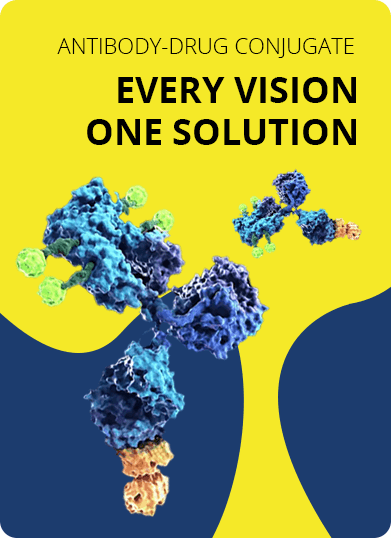Non-internalizing ADC
Classically, antibody-drug conjugates (ADCs) have been developed using monoclonal antibodies (mAb) with high internalizing capacity, in order to obtain an efficient delivery of the conjugated drug within the target cell. However, mAbs specific to tumor cell antigens often exhibit limited diffusion into the solid tumor mass by several mechanisms, including slow extravasation and antibody trapping by perivascular tumor cells (the so-called antigen barrier). Numerous studies have proved that ADC with non-internalizing antibody can also function well. The principle underlying this new approach is based on the fact that because of the reducing conditions, the payload can be released extracellularly, such as in the tumor microenvironment, where it diffuses inside the tumor cells provoking their death. Indeed, many reports have documented that potent therapeutic activity can be obtained by targeting tumor or stroma cells components by non-internalizing ADC in different tumor models. With an extensive library of linkers and payload drugs, Creative Biolabs has constructed the non-internalizing ADC platform to help our clients design and prepare highly customized linker and drug-linker complexes to generate top-quality non-internalizing ADCs.
Non-internalizing ADC
Non-internalizing ADCs have the ability to induce a potent anticancer activity in vivo when used with a suitable payload and may target a broad variety of different malignancies. At present, they mainly rely on labile linkers for drug release in close proximity to the target because the intact ADC cannot passively diffuse into cells. Sufficient experimental data prove the fact that collagen IV, tenascin-C, fibrin, the alternatively spliced extra domains A and B (EDA and EDB) of fibronectin and galectin-3-binding protein (Gal-3BP) are appealing targets for non-internalizing ADC development. Scientific findings offer a preclinical proof-of-concept for curative ADC targeting the tumor microenvironment that does not rely upon antigen internalization.
Popular Targets
- Collagen IV
Collagen IV is a plentiful component of the tumor stroma and an extracellular matrix (ECM) protein found in all basement membranes (BM). Collagen IV forms a supramolecular network in the BM that influences cell adhesion, migration, and differentiation of epithelial cells. ADCs selectively extravasated from leaky tumor vessels can bound to the collagen network in the stroma, and thus create a scaffold, followed by the release of payload to the cancer cells. These free optimized anticancer agents can easily reach the cancer cells by diffusion, although the carrier mAb can hardly penetrate the stroma.
- Tenascin-C
The large isoform of tenascin-C, an abundant glycoprotein of the tumor extracellular matrix, is strongly overexpressed in adult tissue undergoing tissue remodeling, including wound healing and neoplasia, and has been implicated in a variety of different cancers while being virtually undetectable in most normal adult tissues. Tenascin-C splice isoforms represent a group of non-internalizing antigens. They are abundant and easily accessible in perivascular areas of most solid malignancies, representing promising targets for antibody-based drug delivery applications.
- Fibronectin
Fibronectin, an ECM glycoprotein with a fundamental role in blood vessel morphogenesis, is a marker of tumor angiogenesis. Similar to tenascins, splice isoforms of fibronectins are overexpressed in the majority of malignancies, whereas being undetectable in most normal adult tissues, thus, providing the opportunity to treat different cancer types with the same product. The alternatively spliced EDA and EDB of fibronectin represents the best-characterized targets of non-internalizing ADCs.
- Fibrin
Fibrin clots are pathophysiologically specific for tumors. Fibrin clot formation and subsequent replacement with collagen in cancer persist for as long as the cancer cells survive in the body. Scientists once developed an anti-fibrin chimeric antibody that reacts with fibrin only (not fibrinogen) and then attached an anticancer agent to the antibody. Thus, the immunoconjugate did not create an immune complex in the blood stream and was selectively accumulated to fibrin clots in the tumor stroma to create a scaffold, from which effective sustained release of the anticancer agent occurred.
- Gal-3BP
Gal-3BP has been identified as a cancer and metastasis-associated, secreted protein that is expressed by the large majority of cancers. The antibody specifically recognizing secreted Gal-3BP can selectively localize around tumor but not normal cells. Literature data revealed high expression of Gal-3BP in several malignancies, including non-small cell lung cancer, head, and neck, breast cancer, ovarian cancer, prostate cancer, melanoma, lymphoma, and neuroblastoma, while being detectable at a low level in most normal adult tissues. Therefore, conjugates between the specific antibody and the potent maytansinoid drugs could be applicable to a wide range of tumor entities.
ADCs represent a promising class of biopharmaceuticals with the potential to localize at the tumor site and improve the therapeutic index of cytotoxic drugs. Creative Biolabs is dedicated to serving the unique needs of our clients in non-internalizing ADC development by providing customized services that are tailored to meet your timeline and budget. Please contact us for more information and a detailed quote.
For Research Use Only. NOT FOR CLINICAL USE.

Online Inquiry
Welcome! For price inquiries, please feel free to contact us through the form on the left side. We will get back to you as soon as possible.
